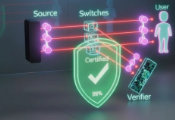What Do the Quantum Experts Really Think of QEC?
November 26, 2025 -- Quantum Error Correction (QEC) is now universally recognised as essential for achieving utility-scale quantum computers that can outperform classical systems on meaningful problems, according to the Quantum Error Correction Report 2025.
In light of this burgeoning QEC landscape, the report itself significantly expanded compared to last year's edition, both in scope and depth. Riverlane consulted twice as many experts this year as in 2024, and their invaluable insights formed the foundation of the publication.
1. Google’s impact on QEC
At the end of 2024, Google Quantum AI demonstrated a quantum memory system for superconducting qubits that significantly reduced error rates, operating below the threshold for effective QEC. Most experts recognised this paper as the defining milestone in quantum computing over the past 12 months, raising the community's optimism. However, many experts agree that the hard work has just begun.
2. QEC is now ‘critical’
2025 marked a pivotal turning point when the quantum computing industry shifted to a QEC mindset. While research continues to explore what can be done with Noisy Intermediate-Scale Quantum (NISQ) devices, all experts agree that QEC is critical to achieving utility-scale quantum computing.
3. QEC is a collaborative journey
QEC does not function in isolation but relies heavily on advancements in both classical and quantum-level qubit efforts. Although the number and fidelity of qubits are improving, experts emphasised that considerable work remains at the qubit level to maintain high gate fidelities and long coherence times as systems scale up. Furthermore, companies are tackling various engineering challenges as they prepare to scale substantially in the coming years, including issues related to signal integrity and networking their QPUs.
4. QEC codes explode and diversify
Research into QEC codes has seen unprecedented growth in 2025. However, there is still a need for more efficient, lower-overhead error-correction codes that consider a broader spectrum of noise. It is possible that, as quantum computers continue to scale, we will see a variety of codes used for different tasks rather than a single dominant ‘winner’.
5. Incremental progress in QEC expected
Aspirations for improved hardware implementations for QEC codes are growing, with further demonstrations expected into 2026. However, 'Big Bang' announcements are now unlikely. Instead, incremental progress will continue as we scale to utility, potentially revealing additional challenges as new noise sources are uncovered.
6. QEC shaping future architectures
QEC is actively shaping hardware architectures, with companies specifically tailoring new systems to accommodate and leverage advances in error correction. IBM's strategic transition to qLDPC codes will encourage other industry players to follow suit, yielding diverse fault-tolerant quantum computing architectures tailored to specific hardware platforms. This shift marks the emergence of a new quantum-computing era characterised by various code families optimised for different platform advantages.
7. The path to value is multidimensional
Integrating QEC requires a collaborative approach that brings together hardware, software and algorithm design. These components must be optimised collectively to ensure reliability and increase confidence in outcomes, rather than simply selecting and relying on specific hardware like FPGAs or ASICs.
8. Towards quantum standardisation
There's an increasing recognition of the need for standardisation in quantum computing, enabling a common language across the industry. Given the rapid pace of developments and uncertainty surrounding the future quantum computing stack, however, many experts agree that, while it’s too early to focus on standardisation, the industry must start identifying small-scale frameworks.
9. Bridging the quantum talent gap
There is an urgent need for experts with knowledge of both quantum information science and classical computer science. This includes fields such as quantum algorithm development, quantum hardware engineering, control systems and advanced error-correction techniques. The current shortage of qualified personnel poses a significant barrier to progress in research, development and commercialisation.
To address this gap, it is essential to increase investment in education, initiatives and training programs to attract and retain talent. This requires expanding specialised training and research opportunities in error correction and quantum technologies at the university level. Additionally, we must address fundamental pipeline issues, such as the shortage of physics teachers and lack of diversity in STEM, to ensure a continuous flow of talent from early education through to advanced research.
10. Opportunity amidst skills shortage
The growing recognition of QEC's importance presents a significant opportunity for those with the right skill set. However, as competition intensifies and quantum companies increasingly seek to develop in-house resources to secure a competitive advantage, a challenge also arises: the limited pool of skilled QEC professionals may hinder their ability to meet these needs.




































